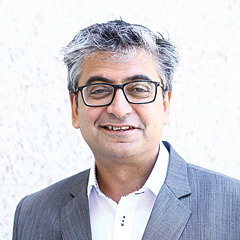Inspired by son's care, mother to become nurse in Kuwait
 Dr. Paul Aurora
Dr. Paul AuroraKUWAIT: A two-year-old Kuwaiti child has been given a new lease of life after receiving life-changing treatment for an undiagnosed respiratory condition at Great Ormond Street Hospital (GOSH) in London. The young child, who spent most of his early life in hospital with an undiagnosed condition that made him very sick and dependent on constant oxygen, was initially diagnosed with an unknown, incurable and complex condition, with doctors hoping he would 'grow out of it'.
After feeling like all hope was lost and seeing his son's condition deteriorate, his father began to search for other hospitals around the world that could treat the child's condition. An encounter with a doctor in Kuwait who told him about GOSH and their world-leading experts in respiratory conditions, prompted him to look into the hospital in London, which treats 1,500 children from the Middle East every year.
After doing some more research and talking to friends whose children have been treated abroad, he decided to travel to GOSH for his son's treatment and see Dr Paul Aurora, Consultant in Pediatric Respiratory Medicine and Lung Transplantation. On arrival at GOSH, Dr Aurora noticed there were problems in addition to the child's lung problems including loss of sight and inability to move and crawl.
"His main problem is a condition that causes difficulty in swallowing due to his prematurity. This is an unusual form of the condition that causes silent aspiration, so can only be diagnosed by specialized testing," Dr Aurora explains. As part of Dr Aurora's assessment of the child's respiratory difficulties, he recognized that these could potentially be due to food and fluid entering the lungs. Therefore, as part of GOSH's multidisciplinary approach, the child was referred to the Speech and Language Therapy (SLT) team for a swallowing assessment.
The SLT assessments, which included a special video X-ray (Video fluoroscopy Swallow Study) indicated that the child had an unsafe swallow. This meant that when he ate or drank, some of the food or drink went the wrong way towards his lungs. To keep him safe, he was given a feeding tube called a gastrostomy so he could have his food and drink directly into his stomach. The gastrostomy surgery was performed by Dr Joe Curry, Consultant Neonatal and Pediatric Surgeon at GOSH.
"I performed the gastrostomy tube insertion. This was done because his swallowing mechanism was unsafe so when he ate and drank it would leak into his trachea and lungs rather than going into his stomach," explains Dr Curry. "This was producing serious chest infections and irritation in his trachea. It's likely he will need the tube for some years to come, and will need assessment and monitoring by Dr Aurora as well as the speech and language therapy team."
Within one month at GOSH, he was able to move and crawl and was even able to stand up. His father and mother were overjoyed to see him being able to play and react to people playing with him. He was also taken off some of the medicine that he was on back in Kuwait, his home country. "Coming to Great Ormond Street Hospital has been such a blessing," his father says. "The process of coming here was very easy and everyone made us feel so welcome and at ease. Having an ill child makes you paranoid and scared but Dr Aurora and the nursing team made us feel at home."
His father and mother are thankful to the staff at GOSH for treating their son; "Dr Aurora is the best doctor - he is calm and helped us gain trust in doctors again. He explained the situation so well to us and came everyday to see us to make sure we understood what the diagnosis was," his mother added. Inspired by her son's care in London, the mother has trained to become a nurse in Kuwait to help improve the lives of children and families in a similar circumstance. "I actually went back home and trained to become a nurse because of the experience I have had here. It has been amazing!"
"His chest has dramatically improved, and because of this he is now gaining weight and catching up quickly on his development. He will continue to need regular monitoring until his condition improves," concludes Dr Aurora. His parents are very hopeful for his future and have already seen many improvements. The family, who are currently in Kuwait, are waiting for the child's final review with Dr Curry. He will be attending his local hospital for regular checkups and appointments with his respiratory doctor to see how everything is going but the parents are very hopeful that he will make a full recovery very soon.
Dr Paul Aurora shares top tips for a wet cough discussed at the 4th Latifa Hospital Pediatric & Neonatology Conference in Dubai:
Wet cough in children is common. If your child is experiencing wet cough, ensure that they:
Drink plenty of fluids, which can help thin the mucus
Get plenty of rest
However, if the symptom is chronic or recurrent then it must not be ignored as it could be the sign of a serious underlying diagnosis. If left untreated, it may lead to permanent lung damage. If you are concerned about your child's cough, visit your nearest healthcare professional immediately. There is a long list of potential diagnoses, so the doctor must assess the history and examination findings carefully before deciding on investigations.











